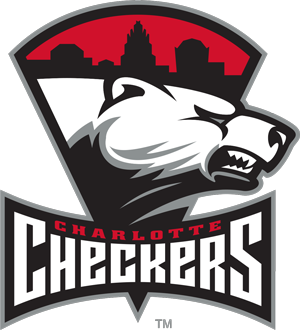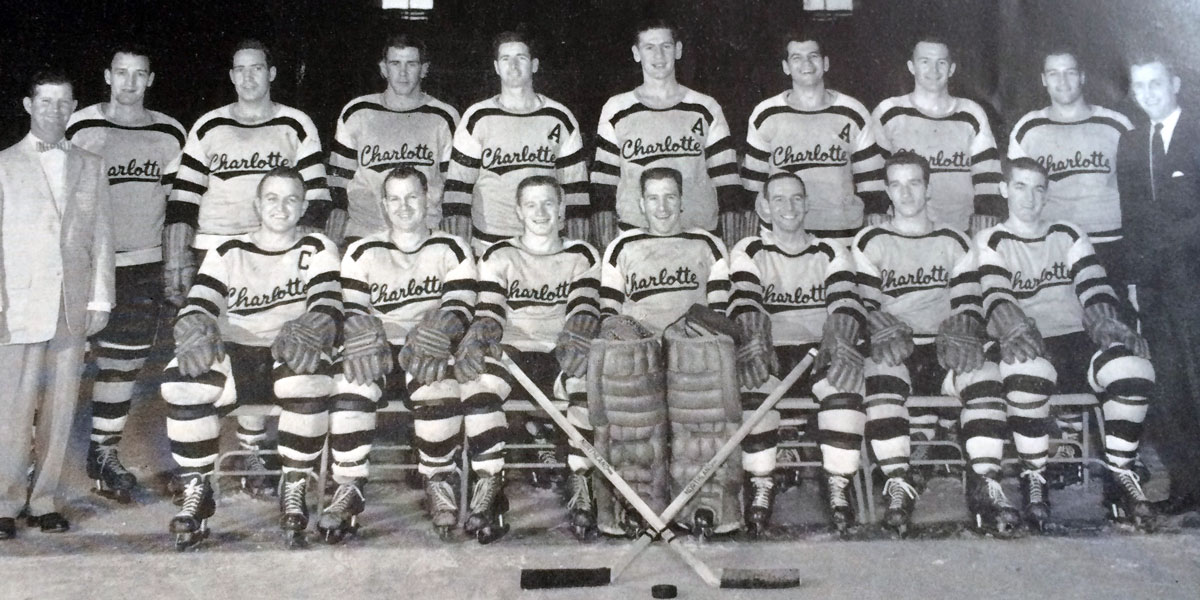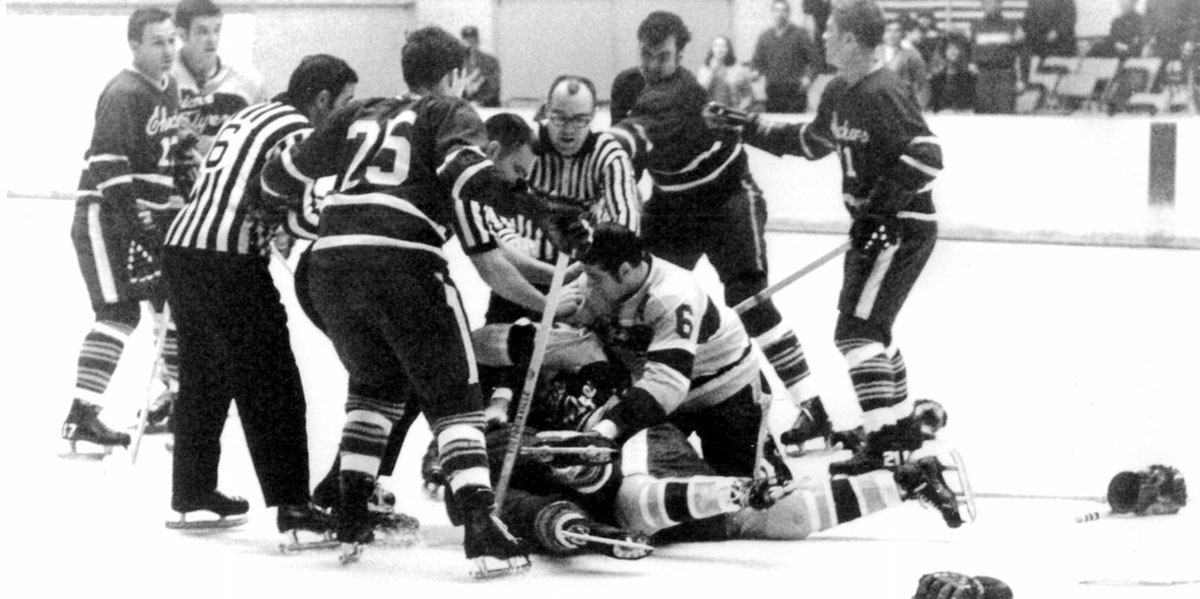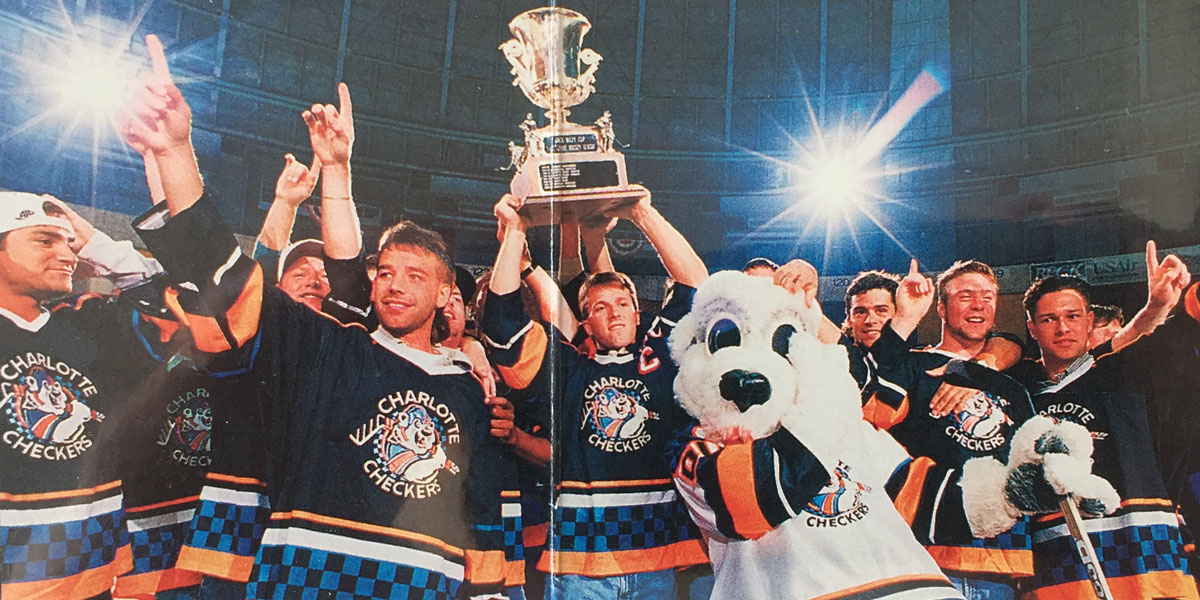The Charlotte Clippers
The history of hockey in Charlotte, and also the history of hockey in the southeastern United States, can be traced back to a fire that took place in Maryland in January 1956.When their home rink burned down midway through the season, the Eastern Hockey League’s Baltimore Clippers needed to quickly find a place to play their final five home games. Enter the Charlotte Hockey Club, a group of investors that had already hoped to put a team in the new Charlotte Coliseum (currently known as Bojangles Coliseum).
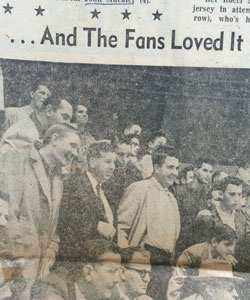
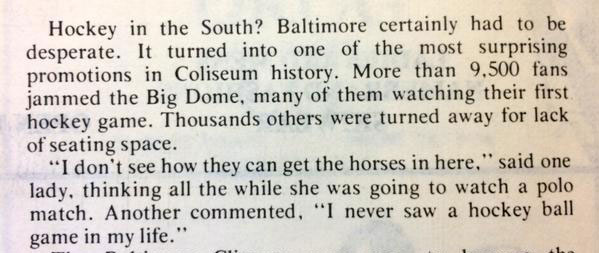 , packed the Coliseum for the 6-2 loss against New Haven. Approximately 3,000 more were turned away.
, packed the Coliseum for the 6-2 loss against New Haven. Approximately 3,000 more were turned away.A total of more than 40,000 fans, many of whom took to the rough-and-tumble nature of hockey in that era2
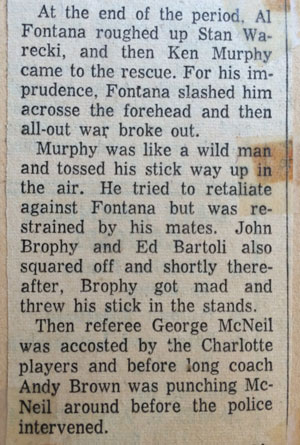 , would show up for those five home games. Despite earlier stating his intentions to return to Baltimore the following season, Clippers owner Charlie Rock, whose team typically played to audiences of 2,000 fans in Baltimore, had seen enough and quickly decided that the Baltimore Clippers would become the Charlotte Clippers3
, would show up for those five home games. Despite earlier stating his intentions to return to Baltimore the following season, Clippers owner Charlie Rock, whose team typically played to audiences of 2,000 fans in Baltimore, had seen enough and quickly decided that the Baltimore Clippers would become the Charlotte Clippers3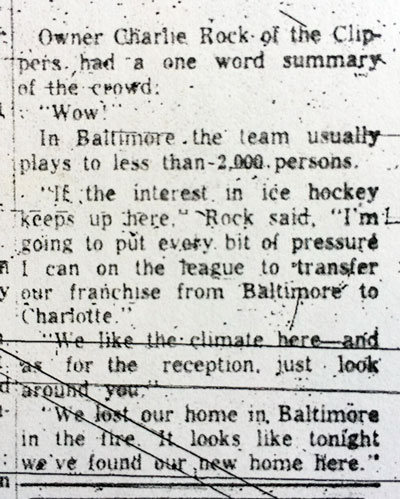 .
.On-ice success would soon follow that of the box office. In their first full season in Charlotte, the Clippers, a team that featured two future NHL head coaches, John Brophy and John Muckler, on defense, captured the EHL’s regular-season and playoff titles in dominant fashion4
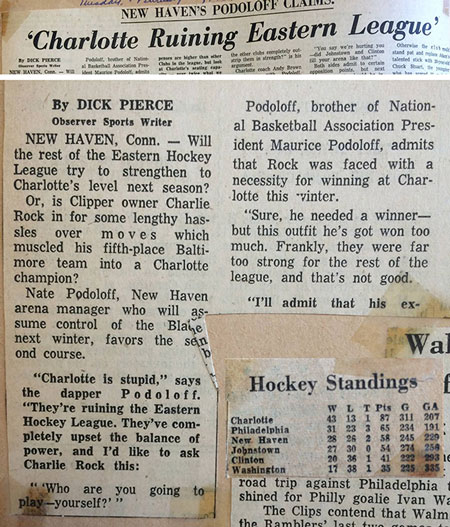 . The 101 points earned by the “Dixie Dandies,” as they were known locally, was the highest total in league history. Heading into the playoffs, they won 21 consecutive games at the coliseum.
. The 101 points earned by the “Dixie Dandies,” as they were known locally, was the highest total in league history. Heading into the playoffs, they won 21 consecutive games at the coliseum.Based on the success of hockey in Charlotte, the EHL would go on to add another team in North Carolina (Greensboro), two in Tennessee (Knoxville and Nashville), two in Florida (Jacksonville and St. Petersburg) and one in Virginia (Salem) over the next 15 years.
The Original Charlotte Checkers
In the late 1950s, the team held a contest to rename the team. After receving hundreds of colorful suggestions5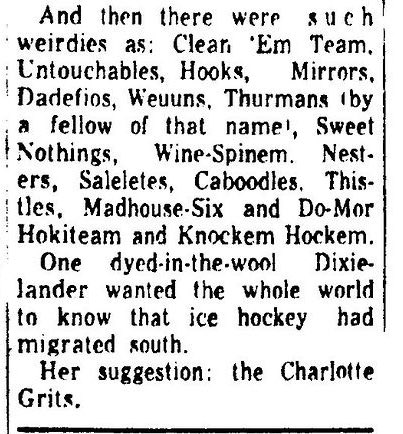 , the team narrowed it down to seven and asked NHL legend Maurice "Rocket" Richard to make the final suggestion via telegram. He chose "Checkers" over Crowns, Vikings, Sabres, Wildwings, Furies and, interestingly, Satans.
, the team narrowed it down to seven and asked NHL legend Maurice "Rocket" Richard to make the final suggestion via telegram. He chose "Checkers" over Crowns, Vikings, Sabres, Wildwings, Furies and, interestingly, Satans.However, the new name did not renew enthusiasm for a team that suddenly found itself struggling on the ice, leading to the Charlotte Coliseum Authority’s takeover of the Checkers in 1959.
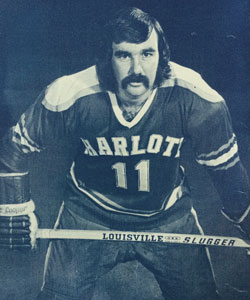
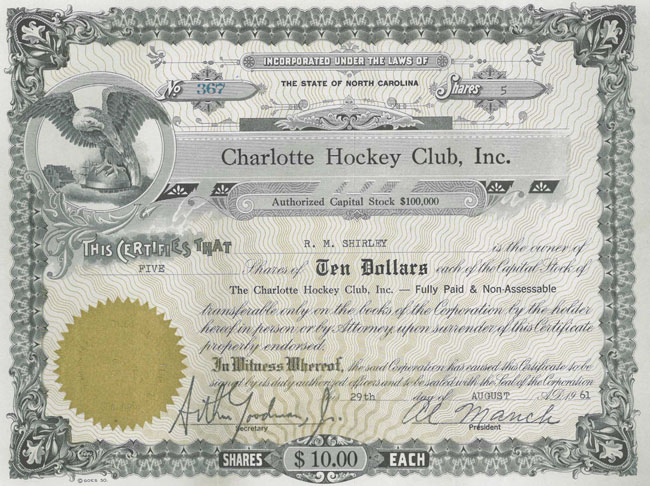 , to keep the team on the ice. Over the next few seasons, coach Fred Creighton slowly built the Checkers back into an EHL powerhouse, winning back-to-back championships in 1971 and 1972.
, to keep the team on the ice. Over the next few seasons, coach Fred Creighton slowly built the Checkers back into an EHL powerhouse, winning back-to-back championships in 1971 and 1972. Following the 1973 season, the EHL split into two new leagues – the Southern Hockey League and the North American Hockey League. The Checkers landed in the former along with Greensboro, Winston-Salem, Roanoke Valley, St. Petersburg and Macon.
In their first three SHL seasons under general manager and coach Pat Kelly, the Checkers lost in the seventh game of the final and then captured back-to-back Crockett Cups as champions in 1975 and 1976. The SHL era would be short-lived, however, as four of the league’s seven teams folded during the 1976-77 season7
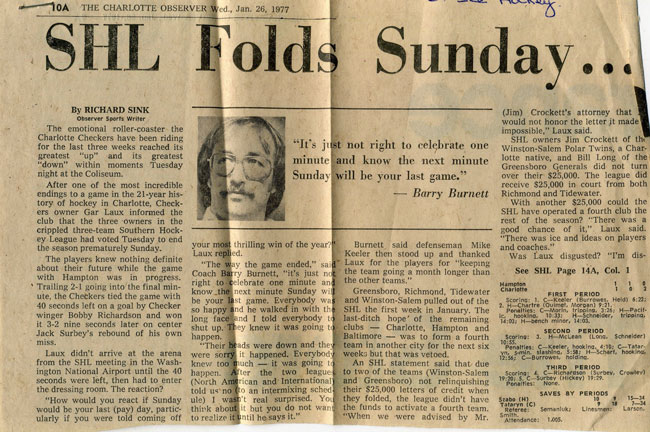 . The three remaining teams, including Charlotte, hoped to join the NAHL but were refused, leading to the end of the SHL.
. The three remaining teams, including Charlotte, hoped to join the NAHL but were refused, leading to the end of the SHL.The Checkers of the era played their last game at the Coliseum on Jan. 30, 1977 – exactly 21 years since their first. Fittingly and coincidentally, the last game was against the Baltimore Clippers.
Records: 1956-77
| Top Scorers | ||||||
| Years Active | GP | G | A | PTS | ||
| 1. | Maurice Savard | 1959-68 | 568 | 303 | 452 | 755 |
| Jim McNulty | 1956-67 | 620 | 346 | 429 | 755 | |
| 3. | Frank Golembrosky | 1968-76 | 337 | 157 | 257 | 414 |
| 4. | Barry Burnett | 1968-77 | 504 | 77 | 262 | 339 |
| 5. | Jack Wells | 1968-77 | 389 | 117 | 213 | 330 |
| Coaches | |||||
| Years Active | GP | W | L | T | |
| Andy Brown | 1956-59 | 128 | 74 | 51 | 3 |
| Pete Horeck * | 1959-60 | 64 | 31 | 29 | 4 |
| Gordon Tottle * | 1960-61 | 64 | 25 | 34 | 5 |
| Joe Crozier | 1961-63 | 136 | 61 | 71 | 4 |
| Turk Broda | 1963-64 | 72 | 30 | 41 | 1 |
| Fred Creighton | 1964-72 | 581 | 328 | 209 | 44 |
| Jack Wells * | 1972-73 | 76 | 26 | 40 | 10 |
| Pat Kelly | 1973-77 | 233 | 146 | 75 | 12 |
* denotes player/coach
Hockey Returns to Charlotte
In 1992, 15 years since the fold of the SHL and the Checkers, the ECHL and commissioner Pat Kelly awarded an expansion franchise to a Charlotte ownership group consisting of majority owners Carl Scheer and Felix Sabates and minority owners Tim Braswell, Richard Petty and Kyle Petty. The team, which would return to the old coliseum (then known as Independence Arena), again held a naming contest, with “Checkers” beating out the second choice of “Blades.”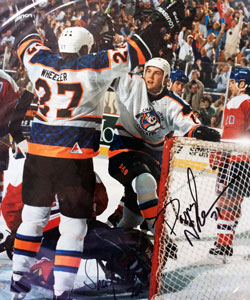
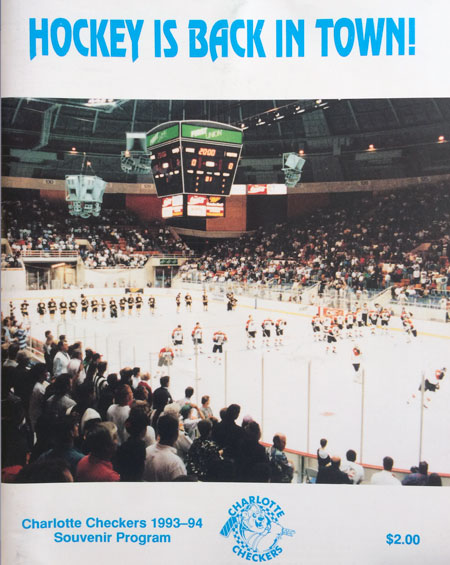 on Sept. 28, 1993.
on Sept. 28, 1993.Continuing a trend shown soon after joining the EHL and SHL years earlier, the Checkers found early success in their new home, winning the Jack Riley Cup as ECHL champions in 1996, just their third season in the league. They were the last team to win a Riley Cup, with the trophy renamed the Kelly Cup in honor of their former coach who retired as commissioner following that season. ECHL teams still compete for the Kelly Cup today.
Beginning with the 2005-06 season, the Checkers moved uptown to what is now known as the Spectrum Center, marking the first time that professional hockey in Charlotte had been played outside of the old coliseum.
Records: 1993-2010
| Top Scorers | ||||||
| Years Active | GP | G | A | PTS | ||
| 1. | Daryl Noren | 1994-2000 | 365 | 174 | 229 | 403 |
| 2. | Matt Robbins | 1993-97 | 256 | 113 | 227 | 340 |
| 3. | Kurt Seher | 1993-2003 | 593 | 73 | 203 | 276 |
| 4. | Dusty Jamieson | 2002-08 | 298 | 139 | 110 | 249 |
| 5. | J.F. Aube | 1995-99 | 186 | 84 | 140 | 224 |
| Coaches | |||||
| Years Active | GP | W | L | T/OT | |
| John Marks | 1993-98 | 346 | 191 | 120 | 35 |
| Shawn Wheeler | 1998-2000 | 105 | 43 | 48 | 14 |
| Don MacAdam | 2000-04 | 293 | 146 | 112 | 35 |
| Derek Wilkinson | 2004-10 | 461 | 237 | 182 | 42 |
Move to the AHL
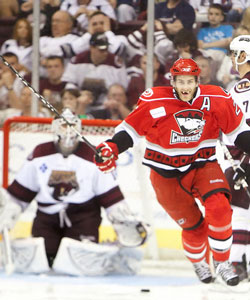
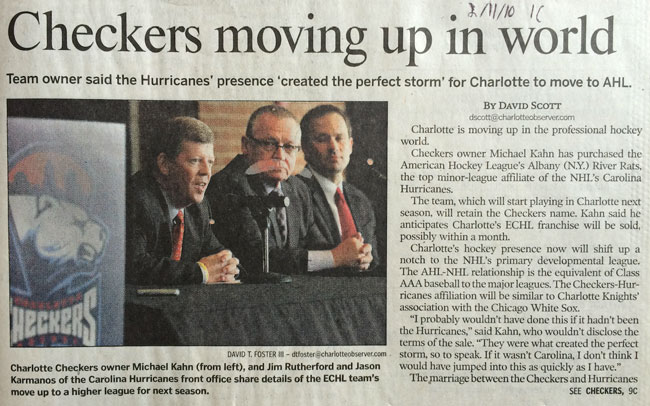 . The team would retain the Charlotte Checkers name and begin play the following season while entering an affiliation agreement with the NHL’s Carolina Hurricanes.
. The team would retain the Charlotte Checkers name and begin play the following season while entering an affiliation agreement with the NHL’s Carolina Hurricanes.In their first AHL season, the Checkers posted 44 wins and 94 points during the regular season, marking the best totals for Carolina’s top affiliate since 2004-05, and advanced to the Eastern Conference Final, which was the deepest a Carolina affiliate had gone since 1997.
Over the first five seasons of the affiliation, the Checkers helped develop several players who went on to play for Carolina, including Michal Jordan, Riley Nash, Victor Rask, Chris Terry and U.S. Olympian Justin Faulk.
After 10 seasons uptown, the Checkers returned to their roots at a renovated Bojangles’ Coliseum beginning with the 2015-16 season.
THE CALDER CUP
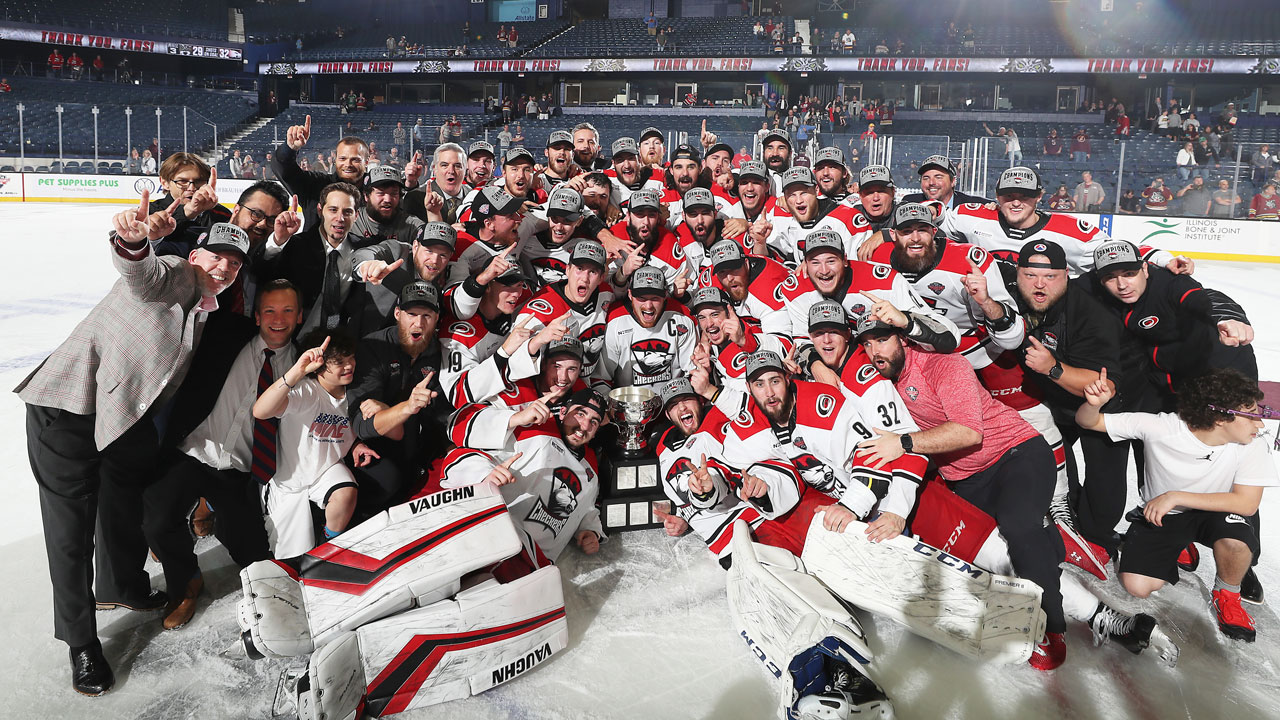 After returning to Bojangles Coliseum, the Checkers’ record improved for four consecutive seasons, culminating in a dominant 2018-19 campaign that saw them earn their first Calder Cup as American Hockey League champions.
After returning to Bojangles Coliseum, the Checkers’ record improved for four consecutive seasons, culminating in a dominant 2018-19 campaign that saw them earn their first Calder Cup as American Hockey League champions.Starting with 10 wins in their first 11 games, the team barely slowed down on its way to the best record in the Atlantic Division, the Eastern Conference and the entire league – all of which were franchise firsts.
The Checkers, led by Mike Vellucci, the Louis A.R. Pieri Award winner as the league’s best coach, and Alex Nedeljkovic, the Baz Bastien award winner as the league’s top goaltender, carried the momentum of their 51-17-8 regular season into the Calder Cup Playoffs, where they went 15-4, defeating Providence, Hershey, Toronto and Chicago on the road to the title. Andrew Poturalski, a first-team All Star in the regular season, led all players with 23 points in the playoffs to capture the Jack A. Butterfield Trophy as the postseason’s most valuable player.
Postseason highlights included a dramatic comeback in Game 2 of the Eastern Conference Final at Bojangles Coliseum that saw the team, which had already dropped the first game of the series at home, down 3-0 late in the second period before scoring five unanswered to win in regulation. That series concluded in front of one of the largest crowds the Checkers have ever seen in the coliseum when Morgan Geekie scored in double overtime to win Game 6.
The Checkers went on to face the Western Conference champion Chicago Wolves in the Calder Cup Finals, dropping Game 1 at home before going on to capture the Calder Cup with four straight wins – three of which were on the road in Chicago.
Two days after their 5-3 victory that won the Calder Cup in Game 5 on June 8, 2019, the team returned home to share the trophy with their fans back home at the old coliseum.
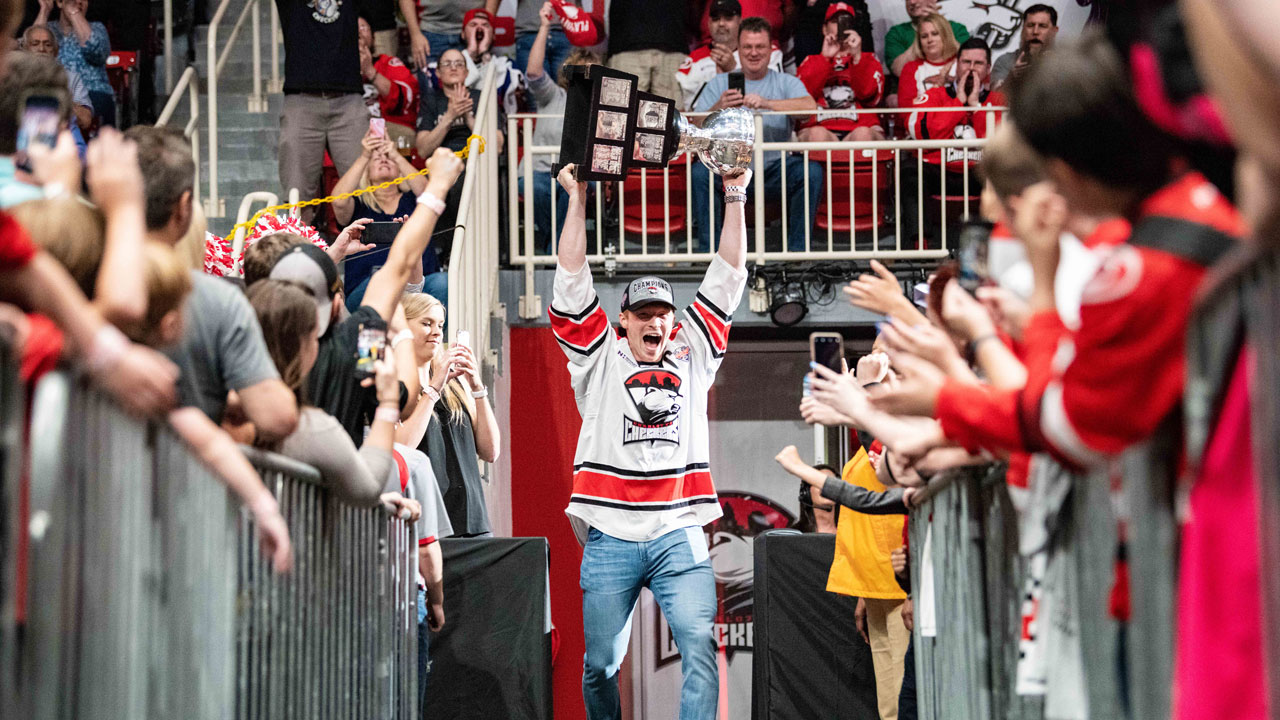
A NEW ERA
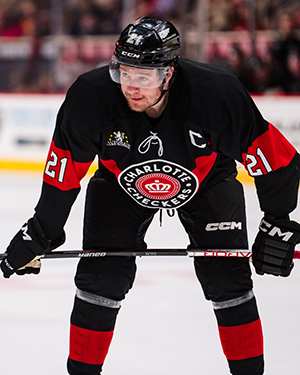
The COVID-19 pandemic led to the premature end of the 2019-20 campaign and to the Checkers opting out of the shortened 2020-21 season. With the Calder Cup not awarded in either of those seasons, the Checkers kept the trophy in Charlotte as reigning champions for three years.
Prior to the 2020-21 season, the team agreed to a multi-year affiliation with the NHL’s Florida Panthers, ushering in a new group of players and hockey operations staff. An exception was Head Coach Geordie Kinnear, who was a Checkers assistant coach from 2010-16 before moving on to lead Florida’s top affiliate. A handful of players from the old Hurricanes affiliation also returned after signing Florida, most notably Zac Dalpe, who made the AHL All-Rookie Team as a Checker in 2011 and, 10 years later, rejoined the squad as its veteran captain in 2021.
In the Checkers’ first season following the pandemic, the Panthers and expansion Seattle Kraken reached an agreement for both franchises’ top prospects to play in Charlotte while the Kraken awaited the construction of an arena in Palm Springs, California – now home of the AHL’s Coachella Valley Firebirds. Former Stanley Cup champion and future Kraken Head Coach Dan Bylsma served as an assistant coach with the Checkers that season, while goaltender Joey Daccord went on to play a key role for Seattle’s NHL club.
The Checkers qualified for the AHL postseason in each of their first three seasons as a Florida affiliate, extending their overall streak to six. In 2024, the Panthers, with former Checkers Gustav Forsling, Steven Lorentz and Eetu Luostarinen on their roster, became the first Checkers affiliate to capture a Stanley Cup championship.
A major milestone occurred when the Checkers and Charlotte Knights collaborated to host Charlotte’s first-ever outdoor professional hockey game, the Queen City Outdoor Classic, on Jan. 13, 2024. The event drew a sold-out crowd of 11,031 people, then a record attendance number for Truist Field in uptown Charlotte, which saw the Checkers defeat the Rochester Americans 5-2.
The following summer brought a major change to the team’s ownership group, with Zawyer Sports & Entertainment, a group led by Andy Kaufmann that included local sports celebrities Kevin Harvick, J.J. Jansen and Regan Smith among its investors, agreeing to acquire a controlling interest in the team. Michael Kahn, who purchased the team in 2006 and brought AHL hockey to Charlotte for the first time, would remain with the team as the largest minority partner.
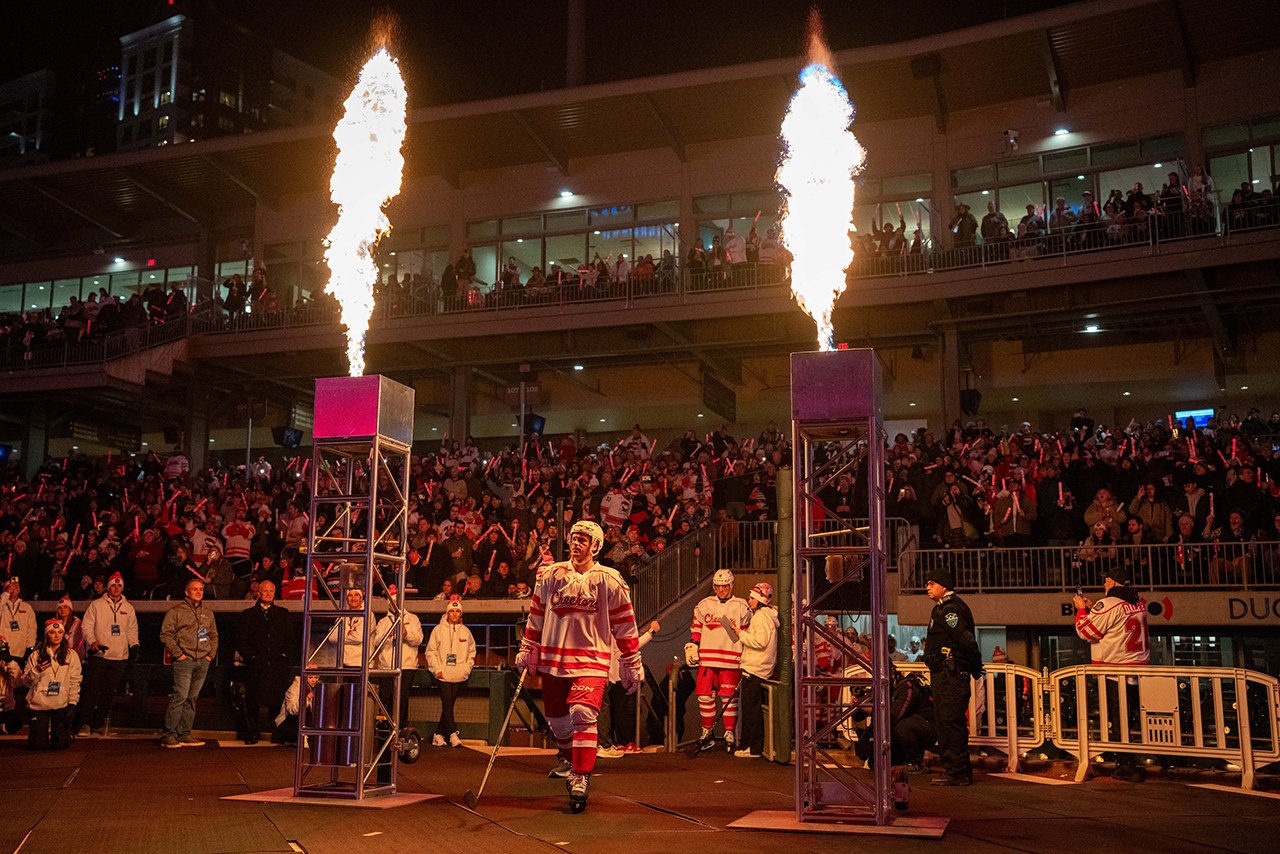
Records: 2010-2025 *
| Top Scorers | ||||||
| Years Active | GP | G | A | PTS | ||
| 1. | Zach Boychuk | 2010-16 | 337 | 123 | 152 | 275 |
| 2. | Chris Terry | 2010-15 | 299 | 104 | 150 | 254 |
| 3. | Zac Dalpe | 2010-13 2021-25 |
362 | 131 | 107 | 238 |
| 4. | Trevor Carrick | 2014-19 2024-25 |
414 | 53 | 178 | 231 |
| 5. | Andrew Poturalski | 2016-19 | 238 | 66 | 110 | 176 |
| Coaches | |||||
| Years Active | GP | W | L | T/OT | |
| Jeff Daniels | 2010-15 | 384 | 192 | 156 | 36 |
| Mark Morris | 2015-16 | 76 | 36 | 32 | 8 |
| Ulf Samuelsson | 2016-17 | 76 | 39 | 29 | 8 |
| Mike Vellucci | 2017-19 | 152 | 97 | 43 | 12 |
| Ryan Warsofsky | 2019-20 | 61 | 34 | 22 | 5 |
| Geordie Kinnear | 2021-25 | 288 | 164 | 97 | 27 |


